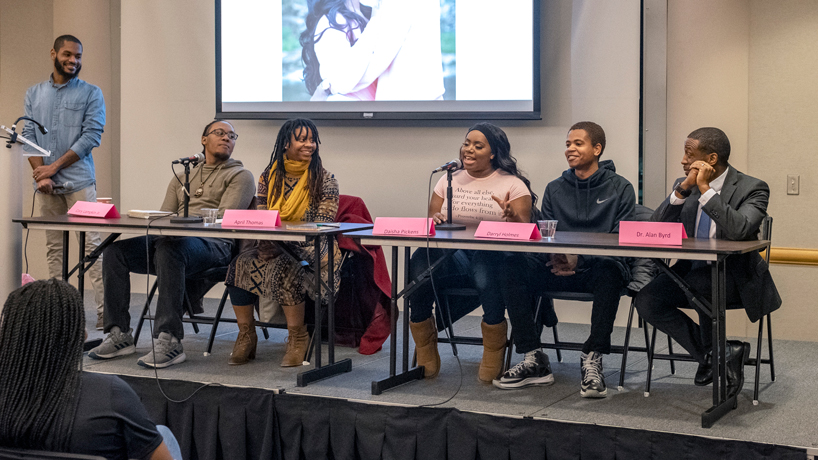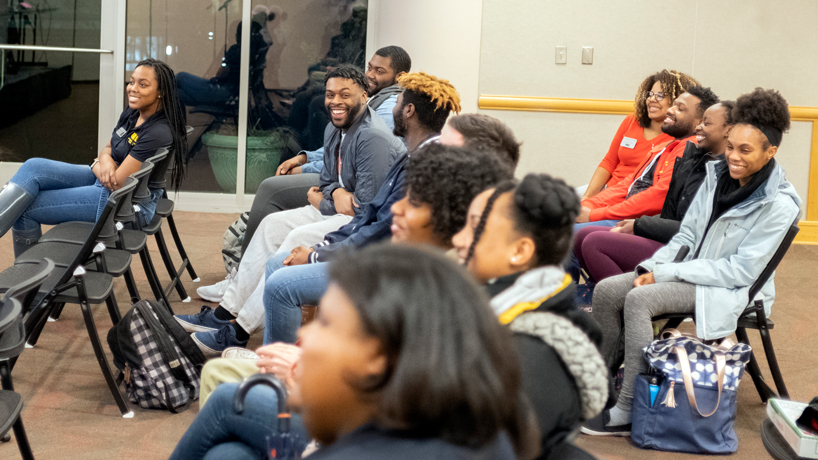
Senior business major Daisha Pickens (third from right) shares insight she’s learned from her relationship with fiancé Darryl Holmes (second from right) during Associated Black Collegians’ seventh annual “Black Love” panel discussion last Wednesday at the Millennium Student Center. (Photos by Steve Walentik)
Associated Black Collegians helped set the mood for Valentine’s Day last Wednesday evening when it hosted its seventh annual ‘Black Love’ event at the University of Missouri–St. Louis.
The panel discussion, part of UMSL’s Black History Month programming, featured relationship insights from seven African Americans involved in committed partnerships – from engaged undergraduate students Daisha Pickens and Darryl Holmes to Alan Byrd, UMSL’s vice provost for enrollment management, who’s been married to his wife, Kimela, for nearly 10 years.
Sophomore Donyell Nelson, ABC’s events coordinator, welcomed an audience of a few dozen people to the Millennium Student Center Century Room C for the event.
“We’re going to have a little bit of a Q&A going, let them introduce who they are and get inside their business a little bit, but all in good fun and love,” Nelson said before turning the microphone over to UMSL graduate and MSC Associate Director Dorian Hall to serve as the evening’s moderator.
Audience members enjoy a laugh during a light moment in the discussion of relationships and how to manage some of their challenges during last Wednesday’s Black Love VII event at the Millennium Student Center.
As the audience enjoyed chocolate covered strawberries and other refreshments, Hall led the panelists – including a newlywed lesbian couple and two first-time parents – to share the stories of how they met their significant others.
Eventually, they dived deeper into some weightier topics including the importance of vulnerability in healthy relationships.
“That’s part of being in love,” Byrd said when it was his turn to weigh in. “It’s about being vulnerable and being able to be yourself and be accepted for who you are 100 percent. I feel bad because I was in a lot of relationships when I was younger where I never really quite opened myself up that way, and I feel bad because we’ve all had good people in our life that we probably didn’t give a fair chance because we weren’t willing to go there.”
Later, they talked about how they manage conflicts brought in by outside forces.
“As a young couple, I feel like we do always have a lot of people look in and say, ‘You’re 20-something-plus years old, so you guys don’t really know what you want, or you’re in college,’” said Holmes, a business major. “They say, ‘That’s your time to explore and experience other people. Once you go to school, you’re not going to be together,’ and it’s all these negative emotions and negative projections on our relationship.
“We just have to realize that that’s what they expect. That’s their experiences. Understanding that we’re not them helps block out all that negative energy, all those negative thoughts and sentiments.”
Holmes said he and Pickens try to deal with internal conflict by remembering that “the issue is not with each other. The issue is with the issue.” They try to work together to address the source of the argument while remembering that they’re on the same team.
Hall pressed the couples to talk about how they cope with financial pressures, how having children has impacted the relationships of the parents on the panel and how they all make time for their significant other amid busy schedules of work, school or both.
Pickens, also a business major, talked about how they try to coordinate their class and work schedules as best they can and how, when they’re together, they focus on each other.
“When we actually have our time we’re like, ‘No phones,’” Pickens said. “No phones, no tablets, especially if we’re sitting and eating. We put that stuff away because we have each other’s attention, so we have to keep a conversation. You could sit right next to somebody and be on your phone all the time and say nothing to this person. We try to make sure we put that stuff away.”
They have also learned to give each other space to get their individual work completed when necessary.















